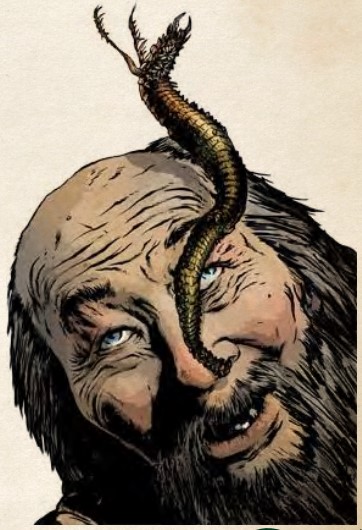
This man looks human, yet emanates a strange sense of other-worldliness in attitude. As he walks towards you, something emerges from his nose.
BRAIN MOLE
CR 6 CN Small Magical beast, XP 2,400
Init +7; Senses darkvision 60 ft; low-light vision; detect sapience 180 ft.; Perception +2
DEFENSE
AC 19, touch 14, flat-footed 15 (+3 Dex, +1 dodge, +1 size, +4 natural armor)
hp 54 (8d10+8)
Fort +7, Ref +9, Will +4
OFFENSE
Speed 20 ft. burrow 5 ft., climb 20 ft.
Melee Bite +6 (1d6-3)
Reach 5 ft.
Psi-Like Ability (ML 8th; concentration +9)
At will –
ego whip (2d4, DC 16)
catfall (fall is 450 ft. shorter)
3/day –
dimension slide (move action)
id insinuation (5 targets, DC 18)
The save DCs are Charisma-based.
*Includes augmentation for the brain worm’s manifester level
STATISTICS
Str 4, Dex 16, Con 12, Int 13, Wis 14, Cha 14
Base Atk +8; CMB +4; CMD 17
Feats Conceal Scent (B), Improved Initiative, Dodge, Mobility
Skills
Climb+22, Knowledge (local) +9, Stealth +15;
Racial Modifiers Uses Dexterity on Climb checks
ECOLOGY
Environment: any rural or urban
Organization: Solitary, infection (host + brain worm), pair, infected pair (2 hosts + 2 brain worms), hive seed (2 brain worms plus one skull thrasher), nest (3-5), infected nest (3-5 hosts + an equal number of brain worms)
Treasure: none (but see the infected host template below)
SPECIAL ABILITIES
Detect Sapience (Su): The brain worm maintains an awareness of sapient minds near itself; it is aware of the precise location of all sapient (Int 3 or higher) creatures within 180 feet of itself. Creatures using the Stealth skill are entitled to a Will save (DC 16) to foil this awareness, and the brain worm cannot detect sapient beings that are immune to mind-affecting abilities in this fashion. The save DC is charisma-based. Detect sapience can penetrate barriers, but 3 feet of stone, 3 inches of common metal, 1 inch of lead, or 6 feet of wood or dirt blocks it.
Infect Host (Ex): Given sufficient time and a helpless living, corporeal sapient (Int 3 or higher) creature, the brain worm can take over that creature’s body for its own purposes. The brain worm carefully burrows into its victim’s body, sealing the flesh behind itself and leaving behind a faint round scar. Over the course of the next hour, the brain worm wraps itself around the spine (or another major nerve cluster) of the host and extends tendrils into the host’s brain. During this time, the brain worm may be extracted with a DC 15 Heal check (which takes one minute and deals both the host and the brain worm 6 points of Constitution damage) or with an application of lesser restoration or similar spells and abilities.
If the brain worm is not extracted before the end of the hour, the host gains the infected host template. Once this occurs, the brain worm is shielded from harm until the host body dies or until it leaves the host (a gory process that takes about ten minutes and kills the host body). The brain worm may transfer itself into another helpless or willing creature while within a host; this process kills its current host body, but otherwise works as described above. The brain worm may not otherwise take actions while within a host (with the exception of those described in the extend tendril ability).
Killing a brain worm’s host body causes it to burst forth in an explosion of gore and bone. The trauma of the event deals 4 points of Constitution damage to the brain worm.
Extend Tendril (Ex): While within a host, the brain worm may extend one of its tendrils out of the host’s nose as a free action. This tendril resembles a smaller version of the brain worm itself, and makes shrill shrieking noises while so extended. While the brain worm’s tendril is extended, it may manifest its catfall and dimensional slide psi-like abilities, affecting both itself and its host body. Brain worms typically only use this ability as a last resort.
Roughly the size of small dogs, brain worms are insect-like beings whose long bodies are coated in small, overlapping scales in dark colors. Brain worms do the most active work in their hives: they are responsible for infiltrating communities, deflecting suspicion away from the hive, proactively eliminating threats, luring victims to the nest, defending the eggs that will hatch into corpse beetles, and advancing the hive’s knowledge. Though brain worms nominally answer to the skull thrasher in charge of the hive, the balance of power is fluid and the end result is something like a democracy, with the local skull thrasher taking the place of ‘first among equals’ in deference to their superior cunning and responsibilities.
Most brain worms are picky about their hosts, preferring those who can grant the hive access to victims or whose social status can be used to advance, conceal, or defend the hive. The brain worm will typically observe a potential host for several days, relying on its stealth and climbing abilities, in order to learn its habits and determine a time to attack. Brain worms attack their victims with ego whip, reducing them to unconsciousness in order to burrow in and take over. Brain worms never attempt to infect a host that is not unconscious or helpless, and they shy away from torture even when it would be an effective tool for their needs. Once inside a host, the brain worm feeds on the psychic energies released by the host body’s semi-functional brain and works to advance the cause of the hive.
If caught outside of its host, a brain worm will attack with ego whip and attempt to judge if it can win the engagement. If confident, the brain worm will press the assault and typically infect its attackers. Otherwise, it disorients them with id insinuation and then makes every effort to escape. Most brain worms display a remarkable loyalty to their hive and will flee away from the location of their nest, circling around to rejoin the hive only if they shake off pursuit.
Though loyal to their hives, brain worms can be sensitive to mistreatment and will rebel against a tyrannical skull thrasher if pushed too far. They can also be naturally curious and seek knowledge for its own sake, which can sometimes lead to brain worms splitting away from a hive as they develop (and pursue) individual interests. Every now and again a brain worm that has been within a host for too long forgets that it ever wasn’t the host, which can be awkward if and when the body dies and the worm is reflexively expelled into the open.
Brain worms understand common and any languages known by their current and former hosts, though they cannot speak without a host body. Within their hive, they communicate with their local skull thrasher via complex body language and/or the skull thrasher’s telepathy.
Infected Host
A sapient being infected by a brain worm is, physically and mentally, almost the same creature. The only outward sign of the infection is a small, circular scar somewhere on the host’s body (usually at the base of the spine) and a tendency to pause when asked a question, as though thinking of a response.
Creating an Infected Host
“Infected host” is an acquired template that can be added to any living, corporeal sapient (Int 3 or higher) creature that is the victim of a brain worm’s infect host ability. An infected host uses all of the base creature’s statistics and special abilities except as noted here.
Size and Type: Size and type are unchanged.
Special Attacks: The base creature loses all of its supernatural, spell-like, and psi-like attacks derived from its class features or feats, as well as access to any psychic powers and/or spells.
Special Qualities: The base creature loses all of its supernatural, spell-like, and psi-like abilities derived from its class features or feats, as well as access to any psychic powers and/or spells, then gains the following qualities:
Soulless (Ex): Upon gaining this template, the base creature is spiritually dead and its soul moves on to whatever afterlife awaits it. Spells and abilities that detect souls instead detect the brain worm lurking inside the infected host. Spells and abilities that affect souls (such as a mirror of life trapping) fail entirely against the infected host. The infected host’s alignment changes to remain identical to the brain worm’s at all times.
Host Body (Ex): The infected host is under the absolute command of the brain worm within it and is not subject to mind-affecting spells or abilities. This control cannot be disrupted by any means short of extracting the brain worm (see the brain worm entry, above), which is fatal to the infected host. The brain worm may freely access all information known by the host previous to its infection, and unless ordered otherwise the infected host will continue its previous habits and predilections.
Abilities: The infected host uses intelligence, wisdom, and charisma of the brain worm infecting it in place of its own.
Skills: The infected host gains a +2 competence bonus to Climb and Stealth checks.
Feats: The base creature loses any psychic feats it possesses.
Challenge Rating: Same as the base creature (note, however, that some base creatures may have their challenge rating lowered significantly – for example, a sorcerer who loses all of their spellcasting when they gain this template). When calculating the challenge rating of an encounter that includes an infected host, include the challenge rating of the brain worm infecting it as part of the encounter.
